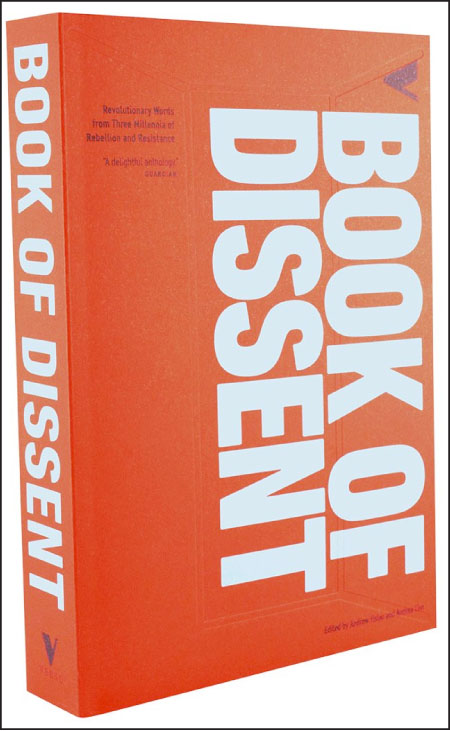
Preface
by Tariq Ali
Edited
by Andrew Hsiao and Audrea Lim
‘WE
ARE resolved”, wrote English revolutionary Gerrard Winstanley in 1649, “to be
cheated no longer, nor be held under the slavish fear of you no longer, seeing
the Earth was made for us, as well as for you.”
More
than two centuries later, Sitting Bull declared: “I have killed, robbed and
injured too many white men to believe in a good peace.”
In
these two statements can be found the tragedy of this Book f Dissent: the
hatred of injustice and the consequences of such hate.
This
anthology of poems, speeches and other soundbites traces human opposition to
tyranny in many forms, from the Spartacist slave revolt to the journalist who
threw a shoe at George W Bush.
Across
time we meet an eloquent Egyptian peasant, the “mad priest of Kent”, a Quechan
Peruvian noble, negro abolitionists and gay activists.
The
book is very much a celebration of the New Left that took form in the course of
the 1960s and has survived, with various modifications, the fall of Communism
and 9/11. After an entertainingly eccentric preface by Tariq Ali that attacks
pseudo-feminist rehabilitations of Marie Antoinette, the reader is treated to a
very right-on compendium of opposition to authority.
Up
against the wall are monarchy, capitalism, colonialism, homophobia and
misogyny. Victoria Woodhull declares that “Yes, I am a Free Lover”; Oscar Wilde
opines that “As for the virtuous poor, one can pity them of course, but one
cannot possibly admire them”; whilst Muhammad Ali asserts: “No Viet Cong ever
called me nigger.”
Given
the cruelty of history, there is little escaping the violence of such
dissidents. In 1899, during China’s Boxer Rebellion, the “Righteous Fists of
Harmony” described their western oppressors with vicious lyricism: “Their men
are all immoral;/Their women truly vile./For the Devils it’s mother-son
sex/That serves as the breeding style”.
For
Robespierre, “Peoples do not judge in the same way as courts of law”, before he
too, at the end of the Terror, went to Madame Guillotine. In her “SCUM
Manifesto”, gendercidal feminist Valerie Solanas derides “Big Daddy in the
corner shitting in his forceful, dynamic pants”.
It
is therefore a relief to hear Leon Trotsky, founder of the Red Army and the man
who “shot down like partridges” the Kronstadt rebels, declare in his last
testament: “Life is beautiful. Let the future generations cleanse it of all
evil, oppression and violence, and enjoy it to the full.”
Such
conflicted destinies show both the value and the limitations of this fine
volume. Dissent seems limited to enemies of the West, economically and
ethically. Chilean poet Pablo Neruda denounces the power of the United Fruit
Company; Iranian Jalal Al-e-Ahmad attacks “Occidentiosis”; Nelson Mandela tells
the court: “I do not deny that I planned sabotage.” There is no reference to dissidents
in the former Communist bloc, with the exception of Soviet physicist Andrei
Sakharov and Polish Solidarity’s Adam Michnik, and some opposition to the
authoritarian capitalist drift of the Chinese Communist regime. It can safely
be said that this book will not figure in any Israeli cultural centre.
Available
at Timbooktoo Tel:4494345
Read Other Articles In Article (Archive)
The signs of the time
Sep 30, 2013, 10:36 AM



